Announcements and Updates
Bookmark this page as your main entry point to the course website. That way, you’ll be sure to see any changes and other information I’ve posted here.
CURRENT ANNOUNCEMENTS
Grades for the course are posted on the grading page
26 December 2021
I have updated the grading page with the overall course grades based on everything I received via BlackBoard up through December 24.
The official grades will be posted to CUNYfirst on Monday night.
My heartfelt thanks again to all of you for a great semester under trying circumstances. Your hard work and enthusiasm made exploring the ancient Aegean gratifying and rewarding for me and for your fellow students. I hope you got a lot out of it, and remember you can always come to me with questions or news about the ancient world. I hope to see you in another ancient history class, and, either way, that your new year is safe, healthy, and rewarding. Good luck!
ARCHIVE
Final Exam grades and markups
24 December 2021
The grades and markups for the final exams are posted.
If you have not yet submitted an assignment, or if you have reversible deductions, please make sure to upload to BlackBoard no later than Friday, Dec. 24.
Position paper grades and markups
21 December 2021
The grades and markups for the position papers are posted.
If you have not yet submitted your paper, or if you have reversible deductions, please make sure to upload to BlackBoard no later than Friday, Dec. 24.
Exams and Papers Received
18 December 2021
The grading page has been updated to show all exams and papers I have received via BlackBoard. I will be working hard over the next few days to clear all of the remaining grading and will update you as assignment and exam grades are posted.
Please take note of any written assignments I am still missing from you, as well as any reversible deductions. The absolute deadline for all late papers and reversible deduction resubmissions is Friday, December 24. Remember that incompletes will not be granted except where mutually agreed in advance of the last deadline owing to extenuating circumstances.
Final Exam Posted
11 December 2021
The final exam questions have been posted on the Final Exam page. Please watch the video for instructions. Your responses must be uploaded to BlackBoard by Thursday, December 16. Good luck!
Welcome to Week 14!
6 December 2021
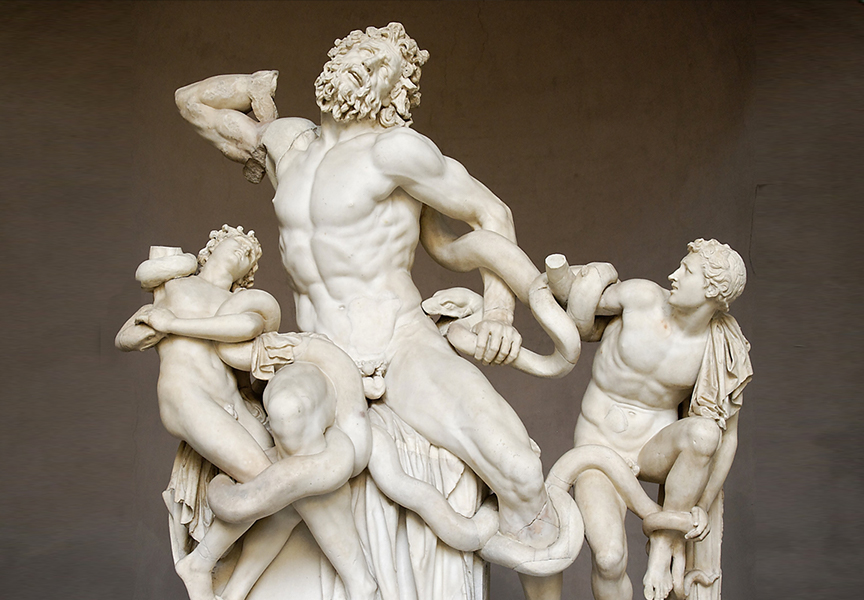
This week we’re talking about the Hellenistic world—the cultural aftermath of Alexander’s conquests that resulted in a changed perspective and new connections in the ancient lands of the east. What transformations stand out most to you as having the most lasting impact? What were the downsides of hellenism in the east, and what did it leave undone? How much did the Hellenistic world truly have in common with Greek culture and the Greek idea?
Also this week you’re completing your position papers. What did you learn from your research and analysis that you’d like to share with the rest of us? How has your perspective on Hellas changed or been reaffirmed as you explored your topic?
Looking forward to discussing all this with you on Thursday. This is our last chance to work together to make sense of the complex story of Hellas, so come to class with questions and your own insights into what we’ve been exploring this semester. See you there!
Review Sheet Posted
4 December 2021
The final exam review sheet has been posted on the Final Exam page.
On this page you’ll find information about the final and review materials. This is also where the final exam itself will be posted. The exam will be posted on December 11, after our last class, and must be posted to BlackBoard no later than Thursday, December 16.
The review sheet is not designed to be a list of answers so much as questions you can use to guide you toward the areas you want to focus on in your review. As you read through the questions on the review sheet, those you have a sense of how you might answer are lower priority for review than those questions you’re not sure how you would answer; those you’d then want to go back and spend some time reviewing in your notes, the readings, the videos, quiz notes, and class discussions.
Also note that the terms are a useful way of finding concepts you need to go back and review, so I’d advise stepping through the terms at the end of each topic and making sure you have a sense of what they mean and why we’re studying them.
To prepare for the essays, I suggest that you focus on what you would consider to be four or five of the major themes of this course, and think about possible questions that relate to those topics across the periods and transitions we’ve explored. For the essay you’ll be asked to give three examples, so you can sketch out a question about a recurring topic in the course, your perspective on that question, and three similar or contrasting examples of that demonstrate that perspective.
Please take a look at the review sheet for details on the exam’s content and structure. The Overview and Instructions video sets out my requirements and expectations. Once you’ve read through the review sheet and seen the video, if you have any questions about the exam or about any of the topics covered in it, please don’t hesitate to come to me.
To get to the final exam page, go to the course website and click on “Final” in the navigation index, or follow the link to the “Final Exam page” post on the Announcements page.
Important upcoming dates
29 November 2021
Please make note of the following upcoming dates for this course:
- Saturday, December 4 — Final exam review sheet posted on the Final Exam page.
- Thursday, December 9 — Last class meeting. Position Paper due.
- Saturday, December 11 — Final exam posted on the Final Exam page.
- Thursday, December 16 — Final exam responses must be posted to BlackBoard no later than this date. No late exams will be accepted.
- Friday, December 24 — Absolute deadline for all late essays, papers, and presentation write-ups. No submissions will be accepted after this date.
- Monday, December 27 — Rosters posted to CUNYfirst.
Please note that, per the syllabus, I do not give incompletes unless the grounds for extending one are discussed and agreed between myself and the student prior to the final course deadline.
Reminder: The Position Paper is due Thursday, December 9
29 November 2021
Here are a few brief reminders about the Position Paper, which is due very soon on Thursday, December 9.
Watch the video. Make sure to watch the overview video, since that tells you exactly what I am looking for. It’s on the Position Paper page.
Thesis statement. Make sure you have an introduction with a thesis statement (your argument asserting your position on the question/problem being addressed) and a body that described and discusses three examples from the sources supporting your thesis statement. For models and explanations on how to do this, see “Writing a Position Paper” (a.k.a. “The Elephant Pamphlet”), which is on the Resources page.
Sources.
- You must use at least three sources, which can be primary or secondary; tertiary sources (including textbooks and most web pages) are not allowed. See the Sources handout on the Resources page for more.
- All assertions must be supported by evidence.
Requirements for all papers. You must adhere to the requirements for all papers (listed on the Essay Musts page). Not meeting the requirements for all papers will mean a lower grade.
Template. There is an MS Word template already set up with some of the formatting I require on the Resources page. If you use Word I strongly recommend making use of this template.
Late papers. As per the syllabus, late papers are marked down by ten points per class meeting, up to a cap of thirty points. Avoid this penalty and block out the time you need to prepare, write, and review your paper so that it can be submitted on time.
BlackBoard. All essays are uploaded to BlackBoard. Look for “Upload Assignments Here” in the left-hand menu. Your essay needs to be uploaded as a Word (preferred) or PDF file attachment, not pasted in as text submission. If you use a browser-based word processor, download or export to a Word document and upload that.
I’m happy to discuss any aspects of your sources or the paper, so please come to me if there’s anything you’re not sure about. I’m looking forward to hearing your interpretations of your chosen depictions of the ancient Greek world!
Welcome to Week 13!
29 November 2021
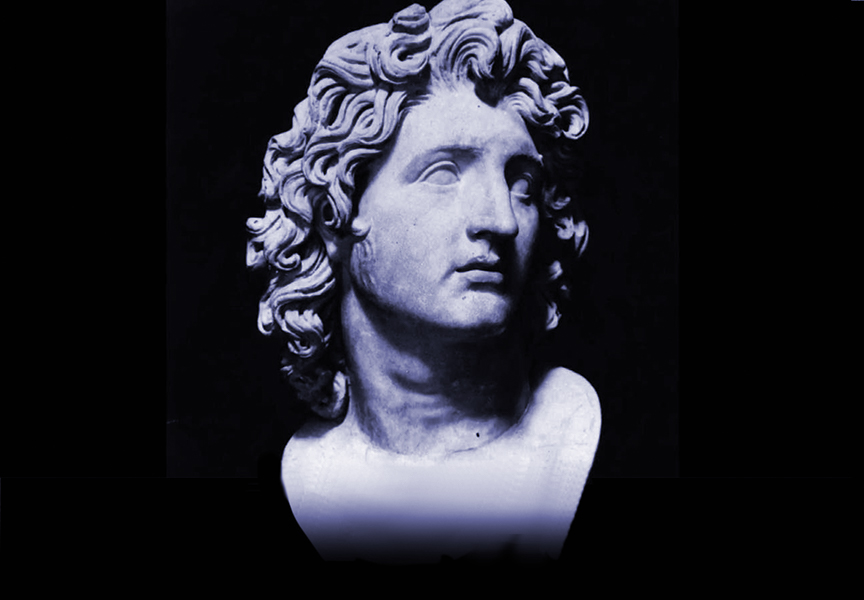
This week we’re talking about that fellow you might have heard of—you know, Phil’s kid. Alexander III of Makedon, otherwise known as Alexander the Great. Does he measure up to his reputation? Does he deserve it, and how much of the credit goes to him and how much to his dad?
What do you think was his true goal in the east? What do you think he should be most known for—what strikes you as most worthy of our attention?
Was his conquest a failure because it didn’t remain unified? What are Alexander’s legacies for the world?
Looking forward to discussing all of this with you on Thursday. See you then!
Courses in Ancient History, Spring 2022
22 November
WINTER 2022 (Jan. 3-23)
Civilizations of the Ancient World
HIS 246-JA01 (46161)
Online-Synchronous – MoTuWeThFr 9:30AM-10:45AM
Prof. Mark Wilson
A survey of the Mediterranean world, beginning with the first humans and tracing the development of civilization from Mesopotamia and Egypt to ancient Greek City-States and the fall of Rome.
SPRING 2022 (Jan. 28-May 24)
Women in Antiquity
HIA 311-XT81 (50985)
HIA 750-XT81 (51065)
WST 311-H81 (58740)
In Person – Tu 6:00PM-8:40PM
Prof. Mark Wilson
Writing and research intensive
Examination of the image, role and status of women in ancient societies, Greece and Rome in particular, as seen from the important literary works of antiquity.
History of Rome
HIA 321-XH81 (51036)
HIA 721-XH81 (51052)
LEH 354-H05 (51013)
In Person – Th 6:00PM-8:40PM
Prof. Mark Wilson
Writing and research intensive
In this course we will explore the foundation and development of the Roman state, including the rise and decline of the Roman Republic and the establishment and fall of the Empire, with emphasis on its political, economic, social, and cultural achievements.
Classical Myth and Society
HIA 314- YM01 (51433)
HIA 714- YM01 (51444)
In Person – Fr 12:00PM-2:40PM
Prof. Marie Marianetti
Writing and research intensive
A comparison of the origins and development of classical mythology and heroic legend as religious beliefs, their relation to other mythologies, and their adaptation in literature and art from Hesiod and Homer through the present. A comparative analysis of Near Eastern and Nordic myth will be provided. Not open to students who have taken ACU 266.
Civilizations of the Ancient World
HIS 246-B301 (51210)
LEH 354-H01 (50982)
In Person – TuTh 9:30AM-10:45AM
Prof. Mark Wilson
A survey of the Mediterranean world, beginning with the first humans and tracing the development of civilization from Mesopotamia and Egypt to ancient Greek City-States and the fall of Rome.
Have a good break!
21 November 2021
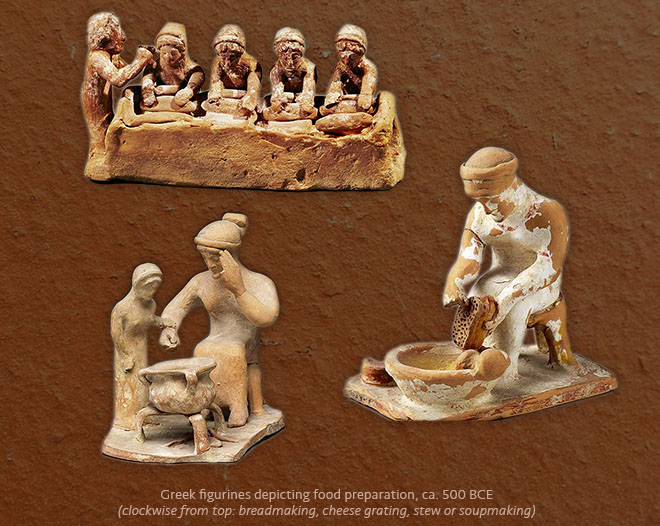
No class meeting this week. Enjoy your holiday and I will see you in Week 13!
Welcome to Week 12!
15 November 2021
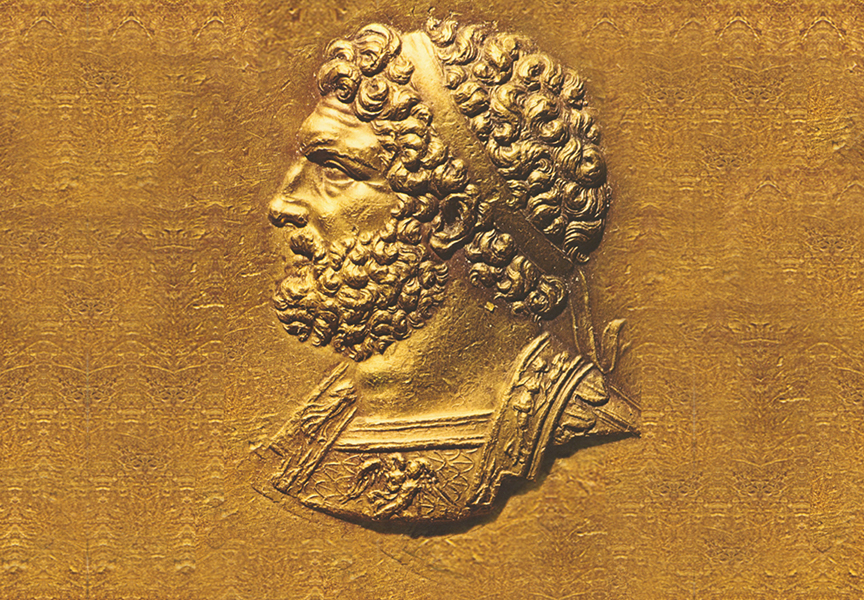
This week we’re studying the appearance of Makedon on the Aegean stage and the dramatic rise of their second-most-famous king, Philip II.
First of all, Makedon. How would you describe their relation to Hellas? Are they Greek (-ish?), or barbarians (-ish?)? What factors stand out especially to you as epitomizing or driving their culture?
Philip’s story is as fascinating for what he accomplishes in Makedon as it is for his swift and relentless absorption of Hellas. How would you describe him, as a man? As a king?
Makedon’s long history before Philip is one of disunity. What do you think is most important in Philip being able to turn that disunity around and unite the Makedonians under his rule?
Finally, what do you think most enables Philip to gain control of Hellas? Is it just that the Greeks are weak, or is it the Makedonian king’s distinctive attributes and abilities?
Looking forward to discussing all this with you on Thursday. See you then!
Welcome to Week 11!
8 November 2021
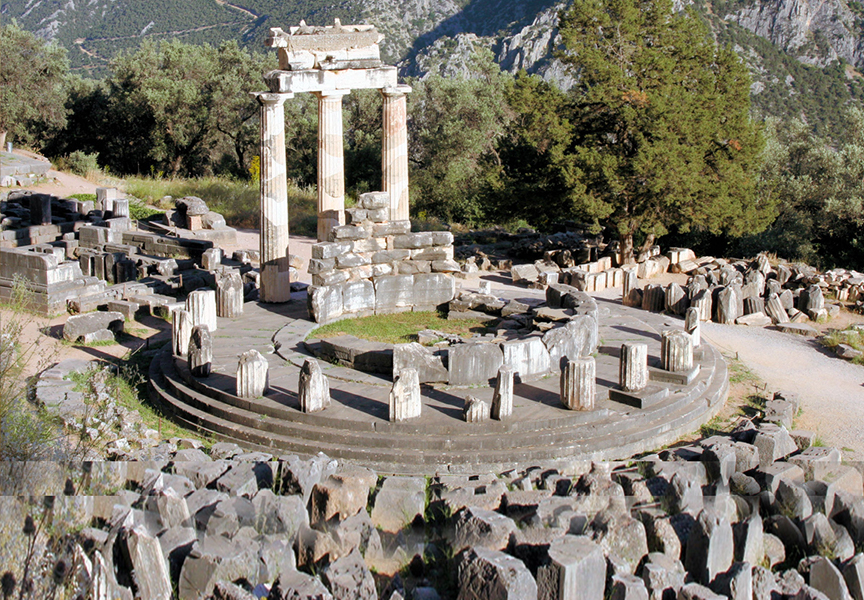
This week we’re taking about the Fourth Century Crisis. The basic question is, Why can’t the Greeks stop fighting each other? What’s driving these poleis into conflict? How have their motivations changed since the fifth century? Is this the same war all over again, or is this something new? How do you think the Greeks are looking at Persia during this period?
Why is the so-called Second Athenian Empire so different from the Delian League/Athenian Empire of the fifth century? Why is Corinth so involved now when it stepped back from the Peloponnesian Wars it helped instigate?
How is new player Thebes different from the others, or is it just like them? Are they able to defeat the Spartans because of Theban strength or Spartan weakness?
If you think the wars are overemphasized, what strikes you as most interesting about what’s going on in Hellas during the fourth century apart from the wars? As radical democracy becomes systematized and a matter of routine, how well does it seem to actually work? What stands out to you among the features of Athenian law and government discussed in this week’s readings?
Looking forward to discussing all this with you on Thursday. See you there!
Welcome to Week 10!
1 November 2021

Here it is, the big war. With the Peloponnesian Wars, the Greeks are fighting each other in a massive, generation-long slog unlike anything the ancient war has seen. Why? Why are they fighting, and why does it last for decade after decade? Can we blame a particular city for this? What is this war really about?
Which leaders stand out the most to you? Are Perikles, Archidamus, Kleon, Brasidas, Nikias, Alkibiades, and the like important to the shape of this war, or are they perhaps representative of the key issues within Sparta and Athens?
Why do you think the war turns out the way it does? Did Sparta win this war, or did Athens lose it?
Looking forward to discussing all this with you on Thursday. See you there!
Note and reminders about the Clouds essay
27 October 2021
Here are a few reminders on the Clouds essay, which is due on Thursday, Nov. 11. Mostly this a repeat of what I have said before, but please read it anyway. Once again, the starting point I’d like you to bear in mind in that this essay is about making an argument and supporting that argument with evidence—in this case, three specific moments from Clouds that demonstrate an illustrate the argument you are making in the essay about what Clouds tells us about fifth-century Athens.
Comparing two works. Regarding Clouds, it’s important to bear in mind that this essay requires you to compare Clouds to another ancient Greek work. Which one depends on which prompt you are answering—make sure to watch the Clouds essay overview video for my discussion of this aspect of the assignment. The essay overview video is very important this time. Watch the essay overview video, is what I’m saying. I would also suggest that you watch the overview video. This also means that you need to carve out time to read the other work as well as to plan and write the essay. Email me anytime if you want to discuss how to approach the essay.
That said, for the Clouds essay you don’t need anything else but the two primary sources. Your essay should focus on three moments from Clouds, and compare each of those moments with a corresponding moment from the other work. More on that in the overview video.
Introduction. In your introduction, make sure you have a clear thesis statement—what you intend to show in the paper. Try to develop a concrete, specific thesis statement that lines up with and responds directly to one of the prompts. You don’t need to include evidence in your introduction; ideally all you need is to set up the issue you are addressing, what the possible sides are, and your thesis. I talk about this a bit in the Overview Video for the essay, and more generally in the Elephant Pamphlet (see the Resources page).
The body of the essay. In the main body of your essay, focus on three specific moments from Clouds that support your thesis. Describe the moment in a paragraph and then spend another paragraph talking about how that moment serves as an example of your overall argument—what you are trying to prove about what Clouds tells us.
Evidence and cites. Major rule of thumb for writing about history (and for academic work in general, but especially history): All assertions must be supported by evidence, and all evidence must be cited. When you describe events from Clouds and the other work (whether it’s in quotes, a paraphrase, or just describing specific ideas present in the story), you need to provide a citation—a footnote or parenthetical cite that gives your source (the book version of Clouds and the other work you are using) plus a page number. You also need a bibliography listing the versions used of both works. See the citations handout on the Resources page. Citations and bibliographies are also discussed more fully in the Elephant Pamphlet.
Requirements for all papers. Make sure to fully review the requirements for all papers (on the Essay Musts page of the course website) before completing and uploading your essay. Also review the prompt for the Essay you’ve chosen to make sure you answered what it’s looking for.
Any questions, let me know!
Welcome to Week 9!
25 October 2021
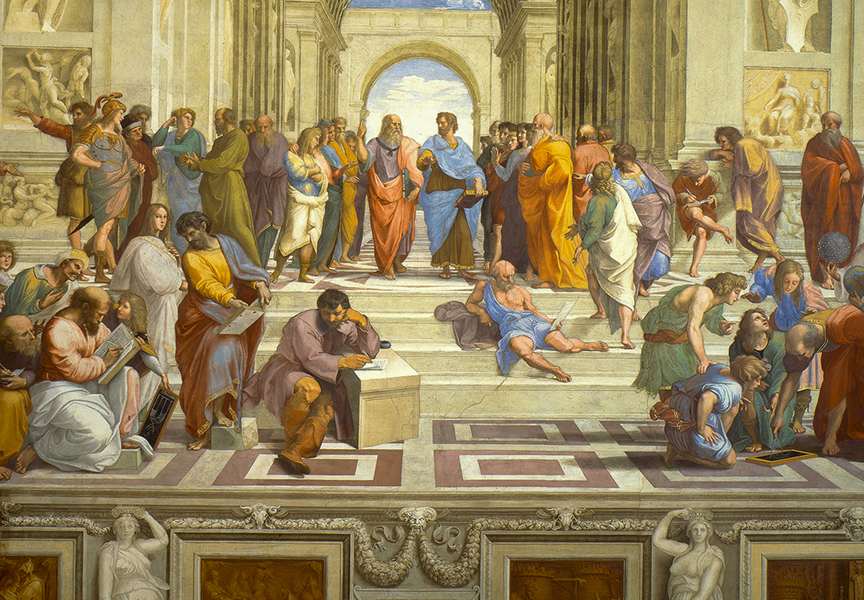
This week we’re exploring the city of Athens itself, and we’re also looking at the very thing we’re engaged in thanks in part to the Greeks—education, both formal and communal. How do you think the Athenians thought about education and the role it played? How does sophistry—the ability to argue successfully regardless of truth or merit—become a thing in Athens, which is otherwise so devoted to the cultural ideal? Why can’t anyone agree on right and wrong?
And in connection with that topic: what I most want to do is hash out what you guys think of Clouds now that we’re finishing it. There are some very striking scenes toward the end. What was most shocking or impactful for you—the debate where Unjust Argument wins (and: why does he win??); Pheidippides attacking his father; or Strepsiades abandoning rational discourse and taking up a torch? What is this play about? What is Aristophanes telling us by having Strepsiades twist around so much? What do you think the play is telling us about classical Athens beyond what Aristophanes intended?
Looking forward to discussing all this with you on Thursday. See you there!
Welcome to Week 8!
18 October 2021
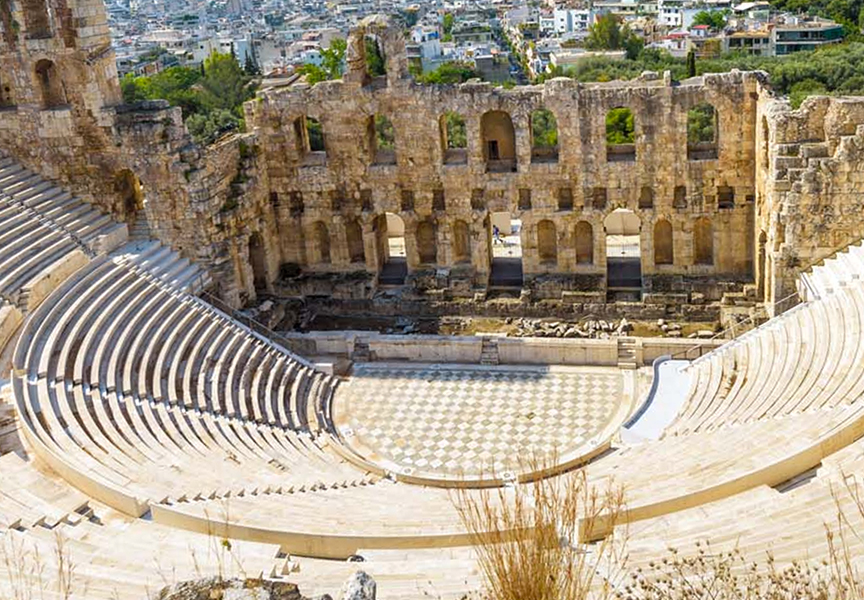
This week we’re exploring the wild ferment that is classical Athenian culture, spanning everything from political innovation to theater and visual art to oratory, philosophy, and natural science. Where does this explosion of cultural expression come from? What drives the Athenians not only to develop new forms like tragedy and comedy, but make then absolutely central to their culture? What is all of this about, to the Athenians?
Not only is all of this cultural combustion happening at the same time during the fifth century, but it’s happening alongside the worst wars in Greek history. Is there a connection? How do the extremes of war relate to the pursuit of extreme cultural expression?
As historians (and in this course we are all historians) we should naturally pay close attention to the “invention” of historical writing, attributed both to Herodotos and to Thukydides. How different are they in terms of method and intent? Are their approaches conflicting or complementary, do you think? What do you recognize in the way they write about the past, compared to how we do it now?
This week we’re also shifting from our Reader excerpts to the exploration of an entire play, Aristophanes’s comedy Clouds. It’s ribald, it’s provocative, and most of all it’s a call to arms. Why do you think the protagonist of this play a confused old man? How does the playwright see the head of the Thinkery, the character called “Socrates”? What elements do you see in this first part that signpost what Aristophanes is trying to accomplish here?
Looking forward to discussing all this with you on Thursday. See you then!
Grading page fixed and updated
16 October 2021
The error that was causing the grading page not to display this week has been resolved, and the page has been updated with the assignments I have received to date.
I will catch up on my grading backlog as soon as I can. I appreciate your patience and will keep you updated on my progress.
Important update regarding Week 7
9 October 2021
Due to a family emergency I will be unable to participate in this week’s online discussion meeting. Therefore, there will not be an official class meeting Thursday night. I’ll leave the discussion area up on the site and you all are welcome to gather informally and discuss the topics raised in this week’s lectures and videos at the usual time, but I won’t count this week’s participation toward your grade one way or the other.
Here’s how my absence will impact the rest of what’s going on in Week 7.
(1) Readings and lectures. Even though there will not be a discussion meeting, you are still responsible for the material in this week’s readings and video lectures, some of which will be covered on the Final Exam. More importantly, what happens in the Persian Wars will deeply affect everything we’ll be talking about going forward, so you definitely want to be clued in to the multiple ways this time is a turning point for Hellas.
(2) The Quiz. Quiz #4 from Week 7 is still due no later than Wednesday, October 20.
(3) The Proposal. Your proposal will still be due via BlackBoard no later than Oct. 21. If you want to discuss topics or approaches with me I am happy to do so.
(4) Any presentations slated for Week 7 should still be posted to the discussion area and uploaded to BlackBoard as usual.
(5) Contacting me. I will have access to my Lehman email, so feel free to get in touch with me with questions about this week’s topics, the Midterm, or anything else. I’ll respond to questions in the evenings if not before.
I apologize for the short notice and the disruption to our normally orderly schedule. I’ll look forward to reading your essays after I get back, and I’ll see you “in class” as usual for Week 8.
Quiz #2 grades and markups posted
6 October 2021
The grades and markups for Quiz #2 are now posted. My apologies for the delay, and I’ll work on reducing the turnaround time on quiz grades going forward.
The good news is that the scores are quite strong for Quiz #2 and up from Quiz #1. My main advice for future quizzes (and your other written assignments) is to remember to be specific and give examples. Good luck!
Welcome to Week 6!
4 October 2021
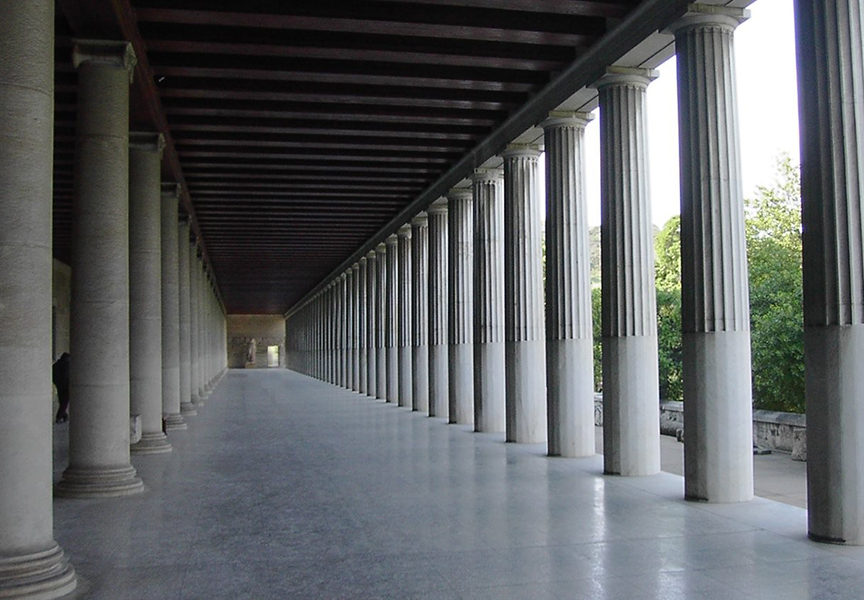
Lots to talk about this week. We’re covering the foundations of Athenian society. Culturally, Athens is the most important of the Greek poleis—just ask them!—but their story is like a fever dream, starting out as a tightly-managed oligarchy of a few privileged families and ending as Hellas’s only radical democracy.
Why do you think Athens was so volatile? What is it about Athens that made them become so aggressive in seeking cultural dominance? What do you think drove them in the direction of democracy? And: Was democracy good for the Athenians? What do you think were the biggest downsides to democracy as practiced by the Athenians?
Looking forward to discussing all of this with you. See you Thursday!
Reminder: The Images Essay is due Thursday, October 7
4 October 2021
Here are a few brief reminders about the Images essay, which is due very soon on Thursday, October 7.
- Watch the video. Make sure to watch the overview video, since that tells you exactly what I am looking for. It’s on the Images Essay page.
- Thesis statement. Make sure you have an introduction with a thesis statement (your argument asserting your position on the question/problem being addressed) and a body that described and discusses three examples from the sources supporting your thesis statement. For models and explanations on how to do this, see “Writing a Position Paper” (a.k.a. “The Elephant Pamphlet”), which is on the Resources page.
- Sources.
- For the museum option, if you can go to a museum in person and view the works directly that is what I strongly prefer, as this option is about your subjective reactions to experiencing the works you are writing about. Remember to choose two works that have the same subject (two little girls, two warriors, two Aphrodites) but from different times or places so you can talk about the implications of how the same concept was conveyed differently in different moments of the story of Hellas.
- For the film option, you need to write about the agenda of the filmmakers and the agenda of the authors of the primary source and how each is using the Greeks to impress their own beliefs (the filmmakers’ and the authors’) on the audience. If you’re not sure about the primary sources for the film you chose, make sure to come to me and we’ll discuss.
- Requirements for all papers. You must adhere to the requirements for all papers (listed on the Essay Musts page). Not meeting the requirements for all papers will mean a lower grade.
- Template. There is an MS Word template already set up with some of the formatting I require on the Resources page. If you use Word I strongly recommend making use of this template.
- Late papers. As per the syllabus, late papers are marked down by ten points per class meeting, up to a cap of thirty points. Avoid this penalty and block out the time you need to prepare, write, and review your essay so that it can be submitted on time.
- Blackboard. All essays are uploaded to BlackBoard. Look for “Upload Assignments Here” in the left-hand menu. Your essay needs to be uploaded as a Word (preferred) or PDF file attachment, not pasted in as text submission. If you use a browser-based word processor, you’ll need to download or export to a Word document and upload that.
I’m happy to discuss any aspects of your sources or the essay, so please come to me if there’s anything you’re not sure about. I’m looking forward to hearing your interpretations of your chosen depictions of ancient Greece!
Welcome to Week 5!
27 September 2021
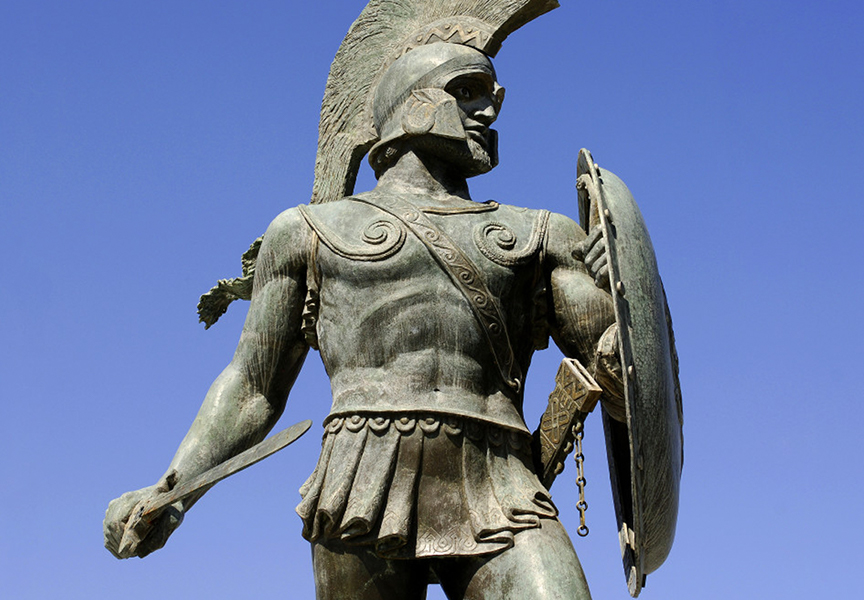
This week we’re talking about Sparta and the art of war. What do you think goes into making the Spartans like this—so different, so focused on being warriors? What does being a warrior society mean to them? Why aren’t more poleis like this, especially given the other cities are so impressed by the Spartans’ dedication?
Is the Spartan experiment a success, in Greek terms? What are the most positive aspects of the Spartan society in terms of the well-being of its citizens? What are the biggest drawbacks of the Spartan system?
A lot is made of the distinctive situation for women in the Spartan culture. How do the Spartan women view their society, do you think?
And there’s this thing called the “Spartan Mirage.” What do you think that’s really about—for Greeks living in the same time as the Spartans, and for modern historians as well?
Looking forward to discussing all this with you on Thursday. See you then!
Quiz #1 grades and markups are posted
20 September 2021
Quiz #1 has been graded, and the grades posted.
If you took the quiz, next to your grade you should see a PDF icon. If you open this, you will see the marked-up version of your quiz, as if I were handing it back in class. Attached to this is a page of notes on the quiz questions. The notes are not the “correct answers” but a rundown of the ideas that came up in the lectures and readings that are relevant to the questions.
On the Week 4 page you can now also view a quiz recap video. This is very important as I use these to emphasize the most important ideas and take-aways from the previous week’s topic, much of which will continue to be relevant in future discussions and assignments.
The first quiz is always an adjustment as we get used to the process and the kinds of questions I ask. Here I just want to note that being specific and using examples are vital to giving strong answers on the quizzes. For this reason it’s important to be prepared by watching the videos, doing the readings, and participating in and reviewing the class discussion. The latter especially is where I try to shine a light of key concepts and transformations, which is also the kind of thing that crops up in the quizzes. For this reason I strongly advise you to always take the quiz AFTER participating in, and reviewing, the class discussion. (I also advise taking the quiz soon after, while all the material is still fresh and marinating in your mind.)
Any questions, let me know!
Welcome to Week 4!
20 September 2021
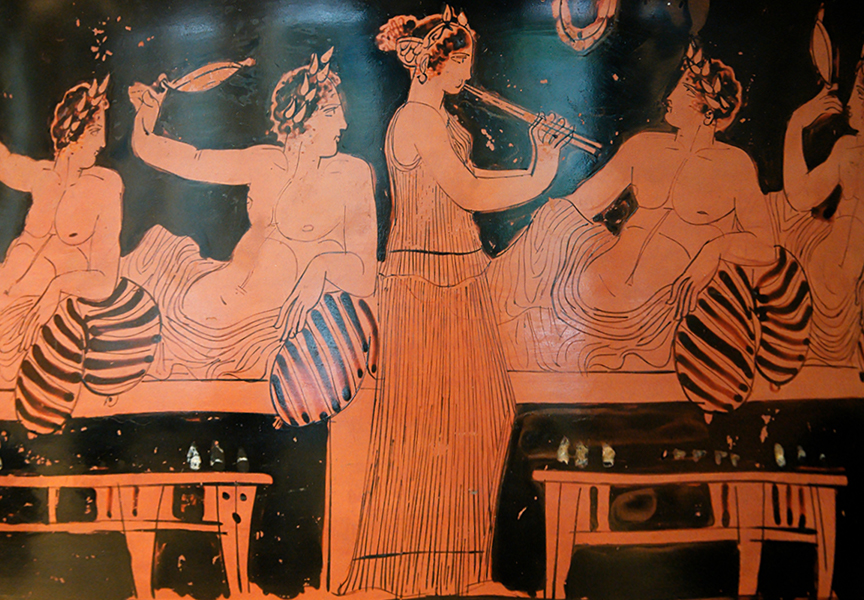
This week we’re talking about the period after the so-called Greek Dark Age, when from our perspective Hellas can be heard and seen again, with the foundations of Greek culture already laid down in the previous, unseen centuries.
This is the time of the polis—the distinctive, kingless Greek city-state; of colonization, with Greek cities sending their people out into the Aegean, the Black Sea, and the Mediterranean; and of the hoplite warrior. Also during this time: the rise of lyric poetry, a sharp contrast to the epic poetry of earlier times; and pan-Hellenism, the curious sense of commonality that grows among all these city-states with defiantly distinct and competitive identities. What do these cities really have in common? What does it mean to be Greek during this time, do you think? And how does that square with their bitter rivalries—not to mention reinventing war?
Two writers emerge during this period that are characteristic of the shifting Greek culture. One is Hesiod, who speaks from the point of view of the small landed farmer—unlike Homer, whose perspective was from the top of society down. What does Hesiod have to tell us about what it meant to be Greek, and is it different from the key values present in Homer’s work? The other author is Sappho, the most famous of the lyric poets. What does her poetry tell us about how Hellas is changing from the days of epic poetry told by rhapsodes?
Looking forward to discussing all of this with you on Thursday. See you there!
No class meeting this week
13 September 2021
Just a reminder that there are no Thursday classes this week. See you next week for Week 4!
If you haven’t taken it, don’t forget there’s a quiz due on Wednesday. My advice is not to wait until the last minute, but either way you must take the quiz no later than Wednesday. The quizzes are a big part of your grade, and they are not made up.
Timing-wise, what happens with the quizzes is that Wednesday night at midnight I close out the quiz and disable the links. After that, there’s an overview video for each quiz where I talk about the key take-aways from the quiz—these are good for thinking back over the quizzes themselves, and they’re also good for exam and essay review as I use these to emphasize the things that I think are most important from the previous week’s topic. The quiz overviews are posted on the Week page for the week after the quiz, so in this case the Quiz #1 overview appears on the Week 4 page.
At some point after the quiz is closed I’ll grade the quizzes. The quiz grades and the mark-ups will be posted on the grading page within a day or two after the close of the quiz. I’ll let everyone know when the grades are up on the site.
Welcome to Week 3!
6 september 2021
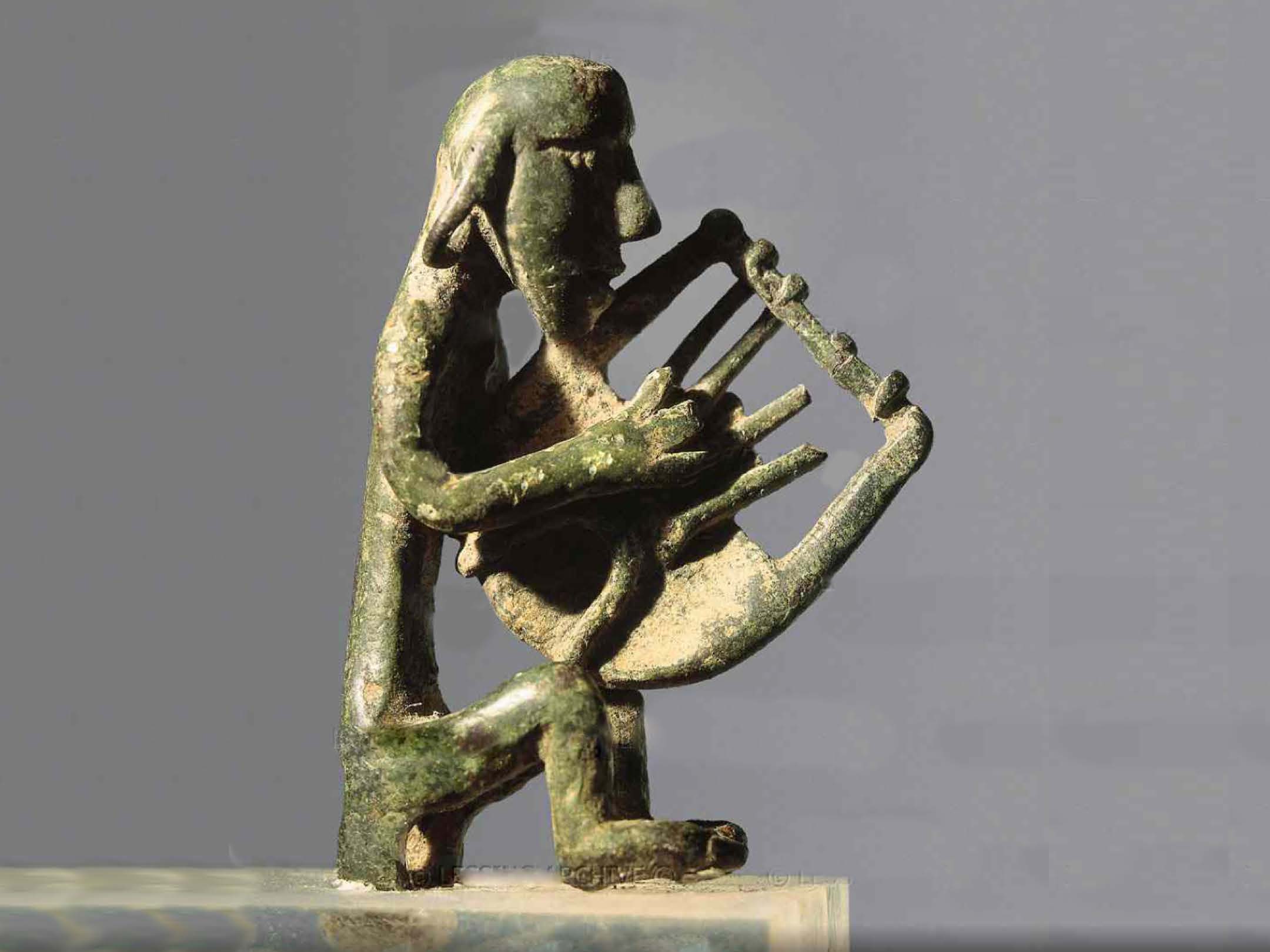
This week we’re talking about the so-called Greek Dark Age—the period during which the Greeks recovered from the collapse of the Bronze Age and built a new civilization.
The Greek Dark Age is frustrating and fascinating to historians of ancient Greece, because this period of rebirth, during which the foundations and chief elements of Hellas as we know it come into being, happens while the Greeks have no writing system and so there are no literature or records until the very end—we can’t hear them creating a new Greek society.
Our best evidence is Homer, the result of stories performed and passed down orally through these centuries and written down at the end, and we’re reading a few excerpts from Iliad and Odyssey—two works that are to become the starting point for all Greek education, both in Aegean and beyond.
From the reading and the videos, what do you think most drove the Greeks during the Dark Age? If the communities of the Aegean were so isolated and so fiercely independent, how did they end up having so much in common? How did they end up with such a clear idea of what it meant to be Greek?
I’m looking forward to discussing the readings from Homer, too. What is Homer yelling us when he describes Achilles and Agamemnon decrying each other, with Briseis in the middle? What’s so significant about Patroklas’s death in Achilles’s armor? When Odysseus meets Nausicaa, what’s this story really about? Is Penelope just being a dutiful wife waiting all those years, or is there more to it, and why are the suitors shown as being so awful?
Looking forward to discussing all of this with you on Thursday. See you then!
Welcome to Week 2!
30 August 2021
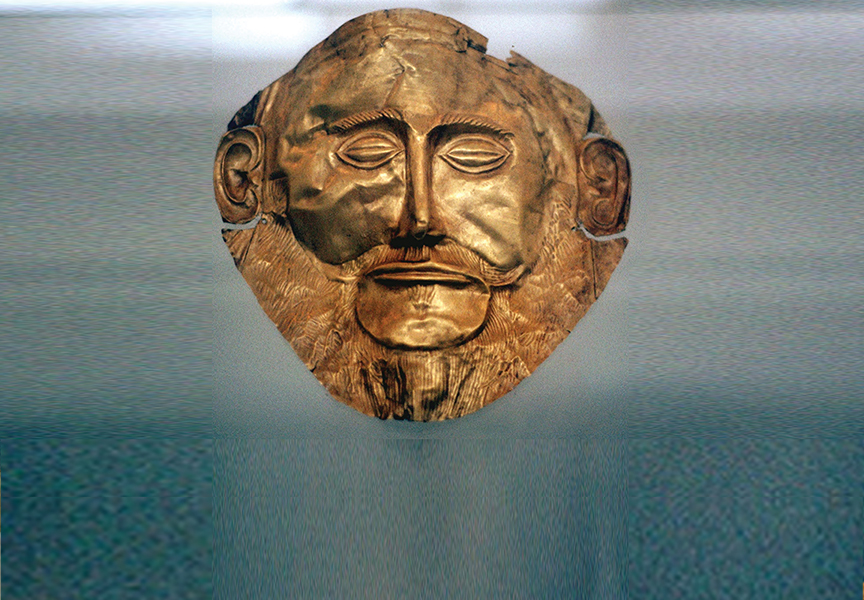
This week we’re talking about the Bronze Age Aegean: the indigenous inhabitants, especially the mysterious Minoans, and the invading Greeks, who swarm in from the north and take over the Aegean world before bringing about their own spectacular collapse, bringing down the whole Bronze Age with them.
There are a lot of things to talk about here. What strikes you as most intriguing about the Minoans—what we know of them? Why do you think the Mycenaean Greeks were so successful in surpassing them? If you were to talk about what was important to the Minoans and to the Mycenaean Greeks, what would be similar, and what would be distinctive? Were the Mycenaean Greeks their own worst enemy in too-greedily building a trade empire, or should we emphasize other factors in the great cataclysmic collapse of the Bronze Age and its civilizations?
Looking forward to discussing all this with you on Thursday. See you there!
Welcome to Week 1!
23 August 2021
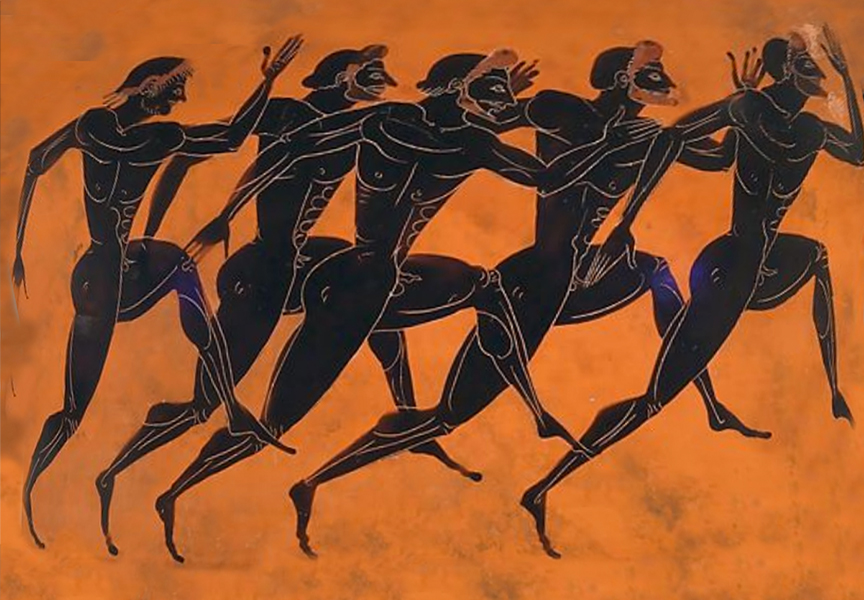
Good morning, and welcome to Week 1 of History of Ancient Greece!
Before Thursday: We’re just starting out this week, and I know some of you don’t have all the books yet. But the videos for this week are very important, as they set out the basics for ideas we’ll be returning to over and over again. Make sure you watch the Welcome video, because it contains stuff you really need to know. Any questions about how the course works, watch the Welcome video first—it answers most of them. If that doesn’t work, you send me an email anytime about anything related to the course.
Sign up for your first “presentation”. You’ll notice that one of the assignments for the course is to take one of the readings from the ancient Greek world we’re studying this semester and present them to the class in the online discussion area. This takes the form of a written discussion of the article, what you think of its arguments, and how it relates to the bigger issues we’re talking about that week. (The details of what I’m looking for are on the Essays page.)
What you need to do now is sign up for the one you want to present. To do that, go to the course web page, enter the course, and click on the “Sign-up” button at the top of the page. The sign-up page has a list of readings. Pick one that seems interesting and then go to the bottom of the page in the discussion area to tell me which one you want.
On Thursday: Our regular meeting time is Thursday evenings from 6:00 to 7:30. When we get together this week, it’ll be in the Week 1 discussion area, accessed at the bottom of the Week 1 page. I know we’re, again, just starting, but I’d love for everyone to post about what you’re hoping to explore, what cultures from the ancient world you find interesting or want to know more about, things about the story of Hellas (The Greek word for the culture and identity the Greeks shared) that you want to look into and understand better—that kind of thing. You can also talk about how other courses and experiences you’ve had might impact on the stuff we’re talking about here. Make sure to read over the other students’ responses and respond to the ones you thought were interesting. Go back to the page later and see what was posted after you did. Posting is part of your grade, but it’s also how we can make sense of the stuff we’re exploring together.
Class meetings: Just to be clear, this course does not use Zoom, and we will be using BlackBoard only to upload our papers. We will instead be meeting every Thursday evening from 6:00 on using a textual discussion area. I’ve been using this way of holding class meetings since the start of the pandemic and I’ve had really great discussions in all my classes. I’m looking forward to meeting all of you there on Thursday.
To get to it, go to the web page for this course on my website (it’s on markbwilson dot com; click on “courses” in the navigation strip and you’ll see this course there) and click on “Enter the Course”. Under “Schedule”, open up the “Week 1” page. That’s where the video lectures and readings for this week are. Before the class meeting on Thursday, watch the videos and do the readings. Then at 6:00 p.m. on Thursday, go ahead and enter the discussion area via the blue button at the bottom of the Week 1 page, and join the rest of the class. That’s our class meeting space, and we’ll use the discussion area on each weekly page to talk about the readings, discuss our reactions, explore possibilities, and ask questions.
To be involved in the discussion, you will need a free Disqus account. Before the meeting, set up your account if necessary and test to make sure you can access Disqus on my site by using the “Test your Disqus login” button, which is also at the bottom of the Week 1 page.
Come to me with any questions! I try to make things as clear as I can, but I know that it takes a little acclimation. I want to help, so email me with any questions or issues. If any of you haven’t replied to my earlier emails letting me know I have the right address to reach you at, I’d be grateful if you did so now.
Looking forward to digging into the Aegean world with you all. See you on the Week 1 page!
Office hours
18 August 2021
I’ve posted my (virtual) office hours, which are via email before class from 5 to 6 p.m. on Thursdays.
BlackBoard page available
2 August 2021
The BlackBoard page for this course is now live. Remember, we’re only using BlackBoard for uploading papers—everything else is here.
Site Map added
2 July 2021
I’ve added a Site Map page, offering you an overview of the full syllabus and easy access to any page in the course website. You can find it by clicking on the sign-post icon at the top right of every page. There’s also a link in the footer as well.
Welcome to History of Ancient Greece (Fall 2021)
1 July 2021
Hi folks,
I’m looking forward to an interesting semester exploring the cultures and transformations of the ancient Aegean, from the Bronze Age to Alexander.
This semester, the course will be all online. But that doesn’t mean we can’t all come together and make sense of the crucial ideas, strangenesses, and commonalities that tell the story of how the fiercely independent communities of Hellas developed the most influential cultures in all of history.
Right now, I need you to do three things.
First, look over the course web page, which will be our base of operations starting at the end of August. Watch the quick welcome and orientation video. Look through each of the pages to see how the course will work, and make sure to click through to the weekly schedule pages to see how the readings, videos, and online discussions are set up. Any questions about how it works, please send me an email.
Second, get the books now if you can. A lot of you will be ordering books online, and you need to make sure you have the books and are ready to go when the course starts on August 26. On the “Books” page I’ve tried to give you lots of different options for getting what you need, but consider ordering now if there’s going to be any kind of shipping involved. (If you come across a legitimate online/e-text version of one of the assigned readings that’s not already listed, please let me know.)
Finally, please drop me an email so that I know I have a working email address for you. You can just reply, reply and say “hi”, or reply with a question or concern, but I want to make sure I can contact everyone (and my usual method of handing out cards to fill in on the first day obviously won’t work in this format). If you receive this email but there is an email address you prefer I use instead of this one, please definitely reply and tell me that.
Email me anytime with questions. I look forward to starting our Greek journey together.
Make sure you’re getting my emails
1 July 2021
If you haven’t been getting my emails, that means I don’t have a good email address for you (or they’re going into your junk folder). If this is the case, please email me and let me know what address I should use to reach you.